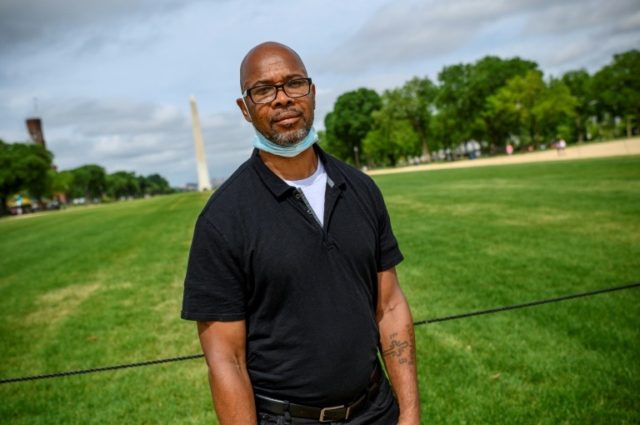Washington (AFP) – Even in normal times, 55-year-old Dennis Adams would have been facing a monumental challenge — adjusting to freedom after spending most of his adult life behind bars, including the last 10 years.
But these are not normal times.
Emerging from his prison cell just to find himself cooped up at home under strict coronavirus stay-at-home orders has been brutal for Adams, who says he just wants to get back on track.
“It’s like being locked up all over again,” Adams told AFP on a hot, humid morning in the nation’s capital.
Adams is an Illinois native, and only moved to Washington in mid-April to live with his niece, after being released on parole.
This time, he had been sentenced to 20 years on narcotics charges — a stiff term because of his prior offenses — and served half of it.
Gaining his freedom during a global pandemic was purely coincidental.
“For 35 years, I’ve been in the penitentiary. From the time I was 17, all the way up to April 17, 2020,” the bespectacled Adams says of his repeated convictions, with short breaks in between.
“It was time for new scenery.”
Adams — who has a tattoo of a cross with “Al Capone,” the notorious Chicago gangster, written next to it — will be on supervised release until 2022.
But life on the outside is not exactly what he envisioned.
‘I fit all the criteria’
Adams only learned about the existence of the novel coronavirus in March when, little by little, access to the common areas of the Dixon Correctional Center was curtailed.
Headaches suffered by his fellow inmates were treated way more seriously than they had been before.
“What they used to do is give you some Tylenol, and ‘Have a nice day’,” he said.
“This time, they were taking peoples’ temperatures, blood pressure and asking a whole bunch of questions.”
However, face masks were never distributed, so a worried Adams made some from old t-shirts and skullcaps.
“I’m looking and I see that I fit all the criteria. I’m Afro-American, 55 years old, had open heart surgery in 2018, and have high blood pressure. I definitely have got to protect myself,” he said.
When it was time to line up in the cafeteria, Adams would remain at a safe distance at the back of the queue, explaining that he would be living with his niece and her young child upon his release.
Drug counseling by Zoom
In Washington, he is trying to reacclimatize to a world that fundamentally changed while he was inside.
He is earning some money by washing cars and mowing lawns for his niece’s neighbors.
One of them asked him about his ID on Cash App, used for mobile payments. Adams was flummoxed.
“I said, ‘Cash App, what is that?’ My niece explained to me you can pay someone straight into their bank account from your phone,” he said.
“I’m still learning how to get familiar with a iPhone,” he added. “With a house phone, I know what to do.”
His weekly mandatory drug counseling sessions are held via Zoom. His niece taught him how to use the video conferencing app that has become indispensable in lockdown.
But all of that does not replace real human connections, which Adams says he sorely needs — especially as he picks up his life in a new city.
“I like to make eye contact when I’m talking to someone and see what kind of body language this person is showing,” he said. “That’s something you can’t get on Zoom.”
He’s also chafing at the restrictions put in place by community leaders to curb the spread of the deadly virus.
“You can’t move around like you want to, to try to get a decent job. Everything is shut down,” he explained.
“So financially, it creates more stress. I don’t want to just sit there and live off my niece.”
‘Simple things’
Adams’ niece is not the only one lending a helping hand. There are multiple associations that work with so-called “returning citizens” as they adjust to post-prison life.
And those groups have more people to assist, after authorities approved early releases to help curb the virus’s spread by whittling down the prison population.
“It’s more tricky — they need more help,” explains Shirl Stephens, a volunteer who is working with Adams, among others.
“They are confused about a lot of things that would have been simple” in normal times, but have been made complicated by the pandemic, she adds.
Paperwork is a chore when city offices are closed, for example. So is getting a doctor’s appointment.
On the day Adams sat down with AFP, he was set to have his electronic monitoring ankle bracelet removed — a major step in his rehabilitation.
As Washington emerges from more than two months of lockdown, having a bit more freedom is a welcome development.
So how does Adams plan to take advantage of it? He says he wants to do some of “the smallest, simple things” that he “never got a chance to experience.”
When asked for an example, he replies: “I’ve never been to a zoo before.”
Of course, he will have to wait — the National Zoo is temporarily closed due to the pandemic.

COMMENTS
Please let us know if you're having issues with commenting.